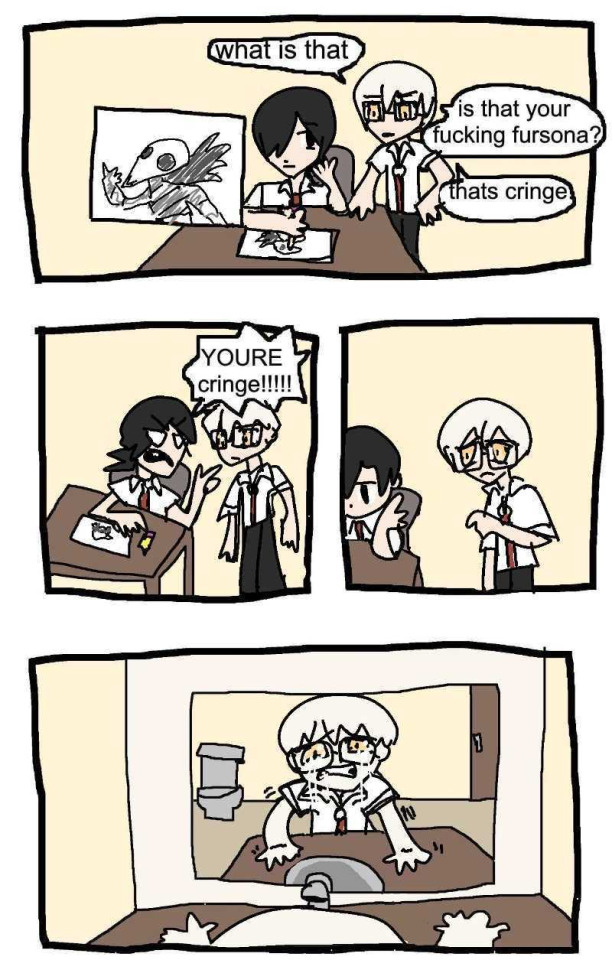#Tokio Kurohara
Text
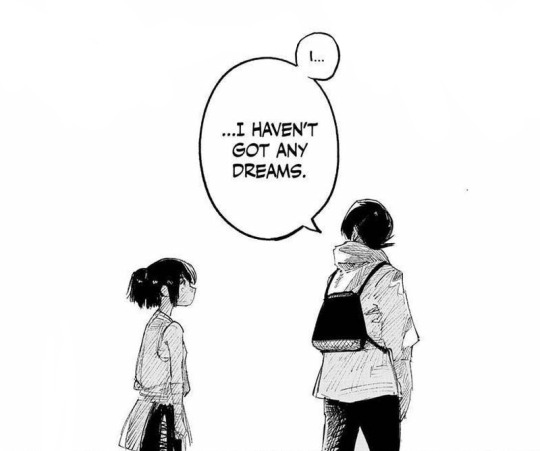
#choujin x#tokio kurohara#manga cap#manga#mangacap#manga caps#monochrome#mangacaps#shounen#shounen jump#shounen manga#weekly shounen jump#shonen jump#manga page#manga post#manga panel#monochrome manga#manga daily#dailymanga#daily manga
462 notes
·
View notes
Text
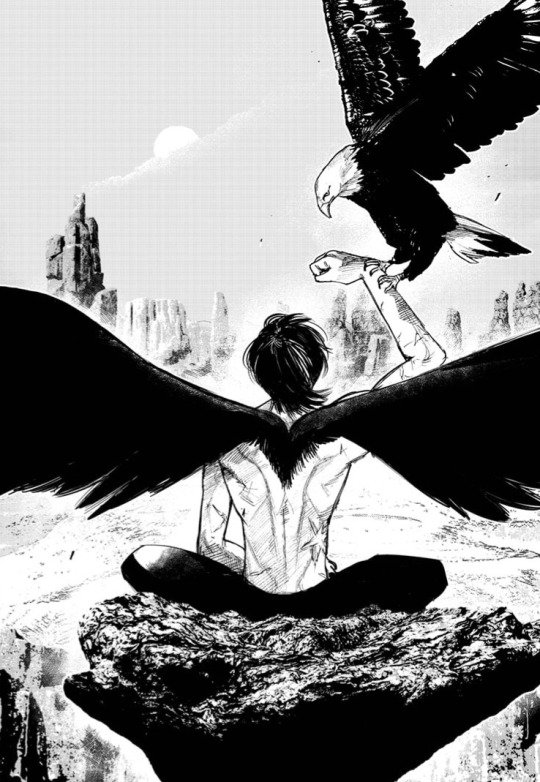
超人X
#超人X#manga#monochrome#choujin x#superhuman x#daily manga#dailymanga#manga panel#tokio kurohara#kurohara tokio#black and white#manga series#manga cap#manga caps#manga edit
782 notes
·
View notes
Text
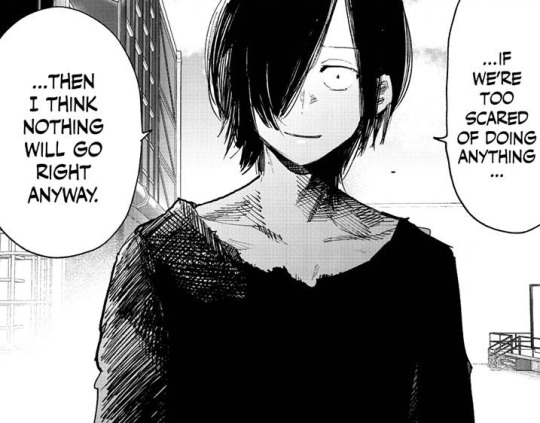
219 notes
·
View notes
Text

Happy new year from Ishida Sui 🎍
#azuma higashi#tokio kurohara#ely otta#ely otsuta#palma shishinegura#choujin x#cjx#ishida sui#sui ishida#tokyo ghoul#manga#seinen
128 notes
·
View notes
Text
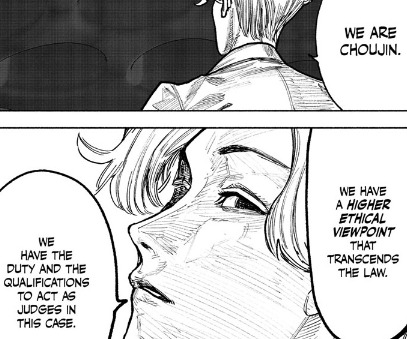
The Great Man Theory of Choujin X
In Crime and Punishment, the 1866 novel by Fyodor Dostoevsky the main character Raskolnikov schemes to murder and rob an elderly pawnbroker. The reason he wants to murder this pawnbroker is not just because he is in debt, but to prove his theory of mankind. For Raskolnikov, all men are divided into two categories: ordinary and extraordinary. The ordinary man has to live in submission and has no right to transgress the law because he is ordinary. On the contrary, extraordinary men have the right to commit any crime and to transgress the law in any way.
We have seen this ethical argument play out again and again in Choujin X in the past few chapters of Choujin X, so I think it's time to take a closer look under the cut.
In Raskolnikov's view extraordinary men are extaordinary they are men who have the gift or talent to alter the world. It is the extraordinary men who forge civilizations to new heights of achievements. Therefore it is the extraordinary man who has the inner right to decide whether to overstep any law or any obstacle that stands in the way of the practical fulfillment of his ideas.

Sato, Tokio's mentor refers to great men of history in a similiar way, as if they were some kind of oppressed class who the laws that protected the masses only hindered.
Choujin, by Sato's viewpoint have the right to transgress the law because the law is made to regulate the masses, that is ordinary humans and not Choujin. By drawing a line between those without superpowers who are in the majority, and those with powers who are in the minority, Sato is dividing humans and Choujin into two separate categories and saying Choujin are inherently superior and have the right to transgress. That he has the right to transgress, because he has a power he was born with.
"I simply hinted that an extaordinary man has the right... that is not the official right, but an inner right to decide in his own conscience to overstep... certain obstacles, and in only case it is essential for the practical fulfillment of his idea (sometimes, perhaps, of benefit to the whole of humanity.) .... I maintain that if the discoveries of Kepler and Newton could not have been made known except by sacrificing the lives of one, a dozen, a hundred or more men, Newton would have had that right, would indeed have been duty-bound to eliminate the dozen or the hundred men for the sake of making his discovery known to all of humanity. But it does not follow from that Newton had a right to murder people right and left and to steal every day in the market. Then, I remember, I maintained in my article that all... well, legislators and leaders of men, such as Lycrugus, Napoleon, and so on were all without exception crimminals [...] in fact many of these benfactors and leaders of humanity were guilty of terrible carnage."
What Raskolnikov is describing here fits the description of the Nietzschian Ubermensch to a T, and in fact it was Crime and Punishment that served as an inspiration for Nietzsche's philosophy.
However, Raskolnikov in the book is far from the Nietzschian ideal. He's described as perpetually gloomy, overly anxious, constantly sick, he's incredibly in debt, barely leaves his house, faints at the drop of a hat. He's no crimminal genius either as when he finally pulls off the crime that he spends the first third of the book plotting he (1) makes a mistake and has to kill a witness, (2) doesn't even rob the pawn broker just grabs a bunch of her stuff and runs (3) takes all the jewlery he took and buries it under a rock and never touches it again.
Clearly, we're working with a crimminal mastermind here.
"A hundred thousand good deeds could be done and helped, on that old woman's money which will be buried in a monastery! Hundreds, thousands, perhaps, might be set on the right path, dozens of families saved from destitution, from ruin, from vice. Kill her, take her money, and with the help of it devote oneself to the service of humanity and the good of all. What do you think, would not one tiny crime be wiped out by thousands of good deeds?"
Raskolnikov's logic is that he will commit one crime and then use the money for the betterment of humanity, only to axe murder a defenseless old lady, a defenseless simpleton, and bury that money under a rock. Perhaps there's a lesson to be learned here.
Charity is just Raskolnikov's justification, his true motive for his crime is to prove his great man theory, and that he's capable of being one of those extraordinary individuals that can change the world by having the werewithal to commit a murder. Raskolnikov wants to divide humanity into superior and inferior, extraordinary and ordinary, and he wants to be in the superior category.
"Thank you, but tell me this. How do you distinguish those extraordinary people from the ordinary ones? Are there signs at their births? I feel there ought to be more exactitude, more external definition. Excuse the natural anxiety of practical law-abiding citizens, but couldn't they adopt a special uniform, for instance, couldn't they wear something, be branded in some way? For you know if confusion arises and a member of one category imagines he belongs to the other, begins 'eliminating obstacles" as you so happily express then..."
In the story the police officer who is hunting Raskolnikov begins easily pointing out the many flaws in Rask's theory of dividing people into two discrete categories. Fortunately for Sato, in Choujin X he has something that is determined for him at birth that he thinks marks him above the laws and restrictions of ordinary people.
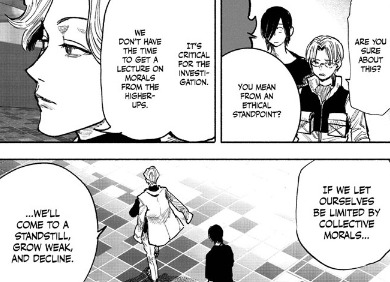
Sato's argument is not that they're going to save more people by taking the route that they're doing, but rather because they are born as Choujin they have an inherent superiority to other people that makes it so the rules don't apply ot them. Having superpowers apparently gives you a moral imperative no matter what those powers are.
Before going further onto the scene I want to remind you that Tokyo Ghoul Ishida's previous work is one of the few works that has ever gruesomely depicted what an evil thing torture is onscreen. It leaves permanent scars in both the main character, and everyone the main character goes onto hurt after the fact.
Jack Bauer Syndrome: Hollywood's Depiction of the National Security Law opens like this.

This "ends justify the means" ideology, or "right to transgress for the greater good" is an idea soaked in our culture, it doesn't just show up in Crime and Punishment and Choujin X. After justifying himself this way, Sato then proceeds to do something which is more or less just torture.

After Palma (willingly cooperating I might add) slices both of her arms up to try to raise a witness from the dead, Sato then orders her neck to be cut open so she can continue to bleed more, in spite of Azuma and later Tokio's protests. The only one who seems to call out his ethical higher viewpoint before he starts torturing her is Azuma.
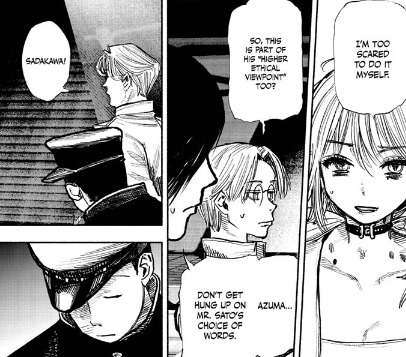
Now, let's say that everything didn't go Sato's way. If Palma just died, or if she'd chaosified and hurt or even killed everyone in the room would Sato have faced any sort of consequence whatsoever? Was he willing to take responsibility if things went wrong? Would have he willingly gone to prison for murdering a person who still has civil rights even if she's currently their prisoner?
I doubt it.
You would think someone with a higher moral imperative, would also hold themselves to that same ethical standard. However, for Sato freedom from restraints under the law also seems to mean freedom from consequences. If Palma had died here, then I doubt Sato would have faced any legal consequences for his actions or have had his power restricted in any way. So, isn't it lucky that everything just happened to work out?
Choujin X seems in part to be deconstructing this very Jack Bauery "It's okay to torture people because that was the only way to stop the ticking bomb and save everyone, and the ends justify the means every single time" kind of logic, with it's discussion of fate, prophecies and Yamato Mori, and Sora Shihouin's role in history.
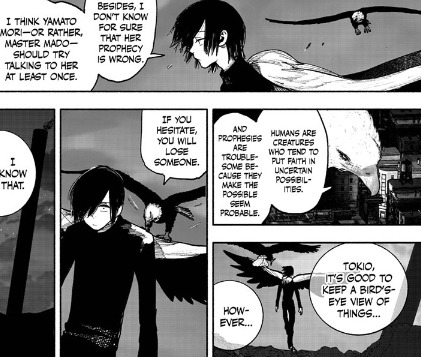
The bird that Tokio talks to is the first character to put the suggestion that maybe none of the prophecies true, they're only true because people have faith in them because they want to think there's a sure thing in life.
Sora's absolute confidence in her prophecies and the ideas of a pre-determined future, lead her to committ atrocities in the name of averting future disasters she is absolutely sure is going to happen.

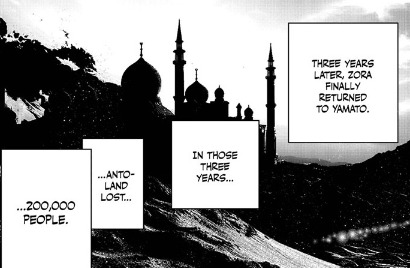
What's 200,000 deaths if Sora was averting the millions of dead she saw in her visions?
From a simple, utilitarian trolley problem perspective if you were to ask most people on the street "Would it be okay to sacrifice 200,000 people if it saved ten million" they'd say yes just based on the numbers. Partially because the human mind cannot even comprehend death on that scale.
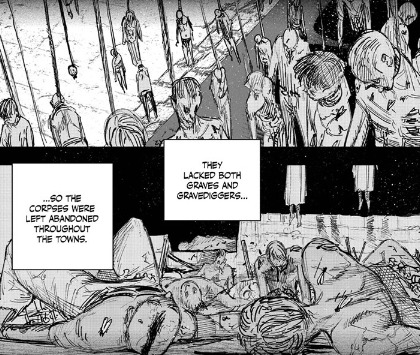
However, the problem with utilitarianism nothing is definite. The ends do not justify the means if the means themselves are uncertain. It's easy to say it's okay to sacrifice 200,000 for 10,000,000 but there was no saying for sure that ten million were actually going to die.
Sora saw one thing. Mado saw another thing. For all we know they could have both been wrong. There's no indication that Choujin X takes place in a deterministic universe with a fixed future, especially since there are multiple seers having different visions which would imply the opposite of that. That there's not one predetermined fate. Sora went and killed those people on the hypothetical possibility that there MIGHT be a disaster in the future she was trying to avert.
Sora was Jack Bauering all over the continent of Anitise. She had to torture those people, otherwise the bomb was going to go off. That only happens in fiction though, becaues study after study after study shows up torture and abuse in prison does not in fact save the day. For the most part it doesn't even happen under dire circumtsances, it happens because guards, police, and authorities are give too much power under the people they keep imprisoned. It's not an ethically dubious way of attaining information to save the day, it's just a common, everyday, abuse of power.
Sora believes just as Sato does, that having power gave her the inherent right to transgress.
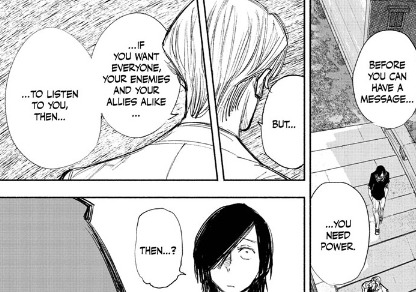
Sato is beginning to more and more hint that the power that Choujins have give them the right to transgress. In a sick way Sora began to mirror Queem in her actions later on in life.

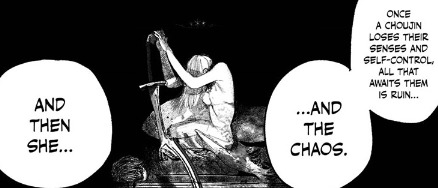

They both became opium addicts. They both fought and fought and fought until they lost the ability to maintain their human form. They both invaded someone else's sovereign territory, instigated a war, and then committed genocide.
Most of all they both believe in their own superiority. While Queem believed in Choujin Supremacy seeing himself as a conqueror and a warlord, Sora has a savior complex, invading foreign territories under the dubious reasoning of "saving them" and committing atrocities that look like modern-day religious crusades.
Why did both of them do what they did?
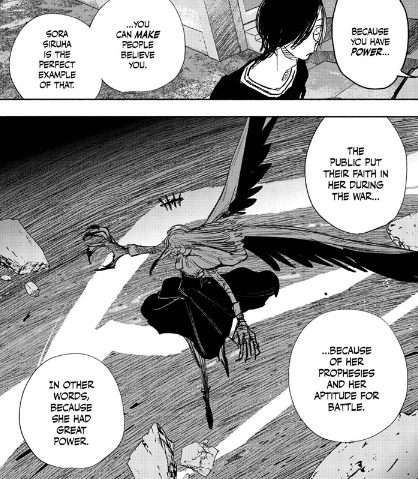
Because they believed the power they had gave them the right to transgress, and because other people who believed the same went along with their actions and helped them.
#cx meta#choujin x#sora shiunin#azuma higashi#tokio kurohara#choujin x meta#choujin x spoiler#choujin x 49.3#cx 49.3
56 notes
·
View notes
Text
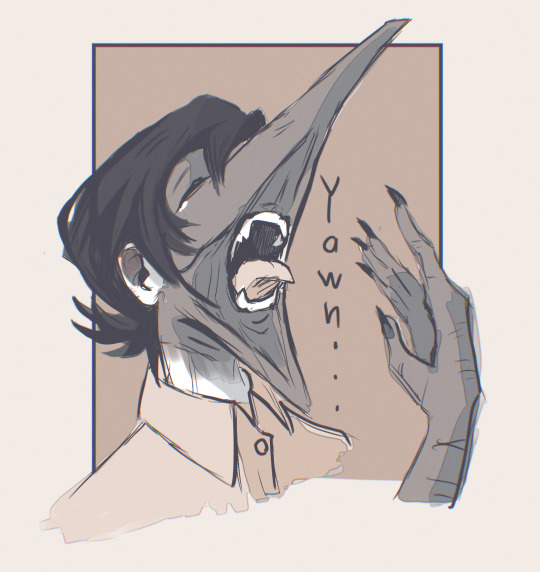
I am compelling the masses to read Choujin X. It's not Tokyo Ghoul and if you go in expecting the exact same feeling you will be disappointed, but it's a fun ride in its own right.
#Quinn said I'd like batista so I figured I'd read the manga between rote chapters 'cause sometimes fitzchivalry makes me want to scream. So!#I'm liking it and here's a little doodle while I work on a bigger piece.#This referenced from a specific panel I can't find now but he was eating something#mediocre art#choujin x#tokio kurohara#kurohara tokio
124 notes
·
View notes
Text
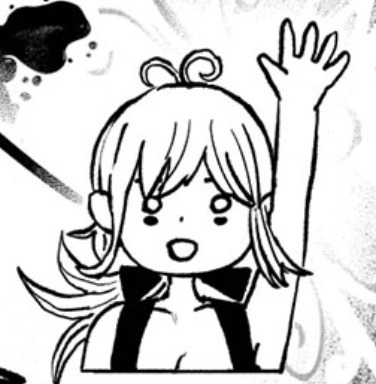
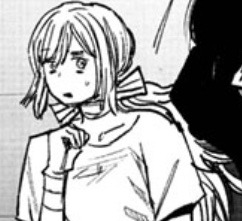
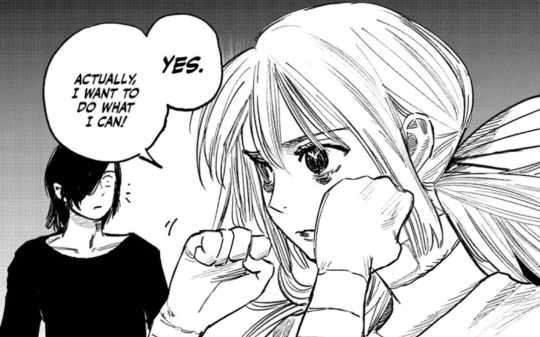
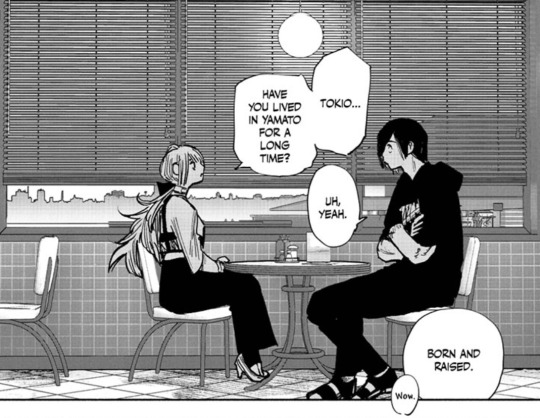
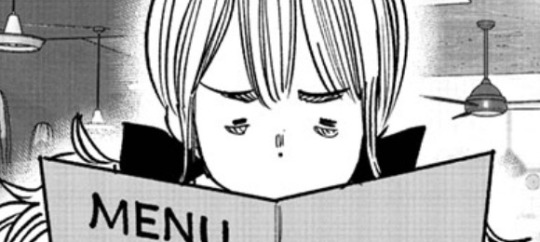

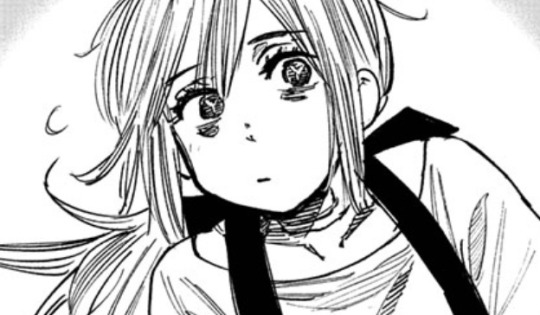
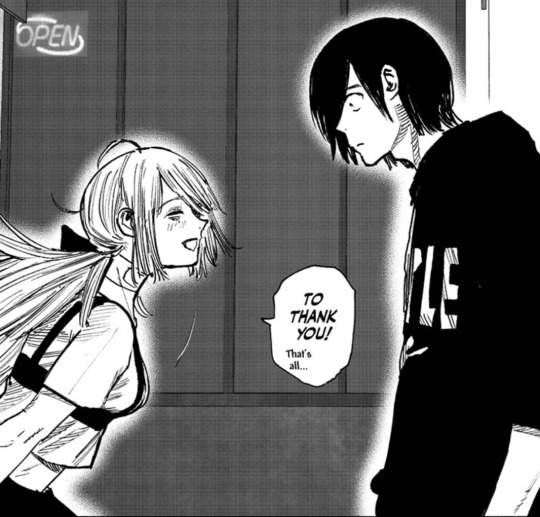
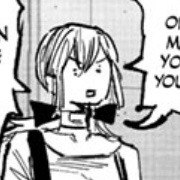

Palma is my daughter she is the little creature of all time look at her
48 notes
·
View notes
Text


Catching up with Choujin X and I'm kind of obsessed with Tokio's post-timeskip character design. I love that his hair's gotten shaggier but he's kept the goofy emo bangs. I love how absurdly tall and lanky he's gotten. Being so tall gives him an excuse to be awkwardly hunched all the time, which really suits his character. Kid doesn't know what to do with all that height.
Also, CX continues to feel like the protagonist of this story "should" have been Azuma, and Tokio should have been his weird codependent sidekick who may or may not eventually become a villain. It's just that somehow Tokio has become the main character of the world instead, and neither Tokio nor Azuma knows how to deal with it. And this design suits that very well.
This is a boy who was made to awkwardly loom, and loom he is.
#to be clear my comment on tokio not feeling like he 'should' be the main character is a good thing#'the weird codependent sidekick was forced to be the hero' is a big part of cx's appeal IMO#I forget about this manga for months ag a time. but every time I catch up it's so good#invasion of the frogs#choujin x#tokio kurohara
62 notes
·
View notes
Text
July 26, 2023

61 notes
·
View notes
Text
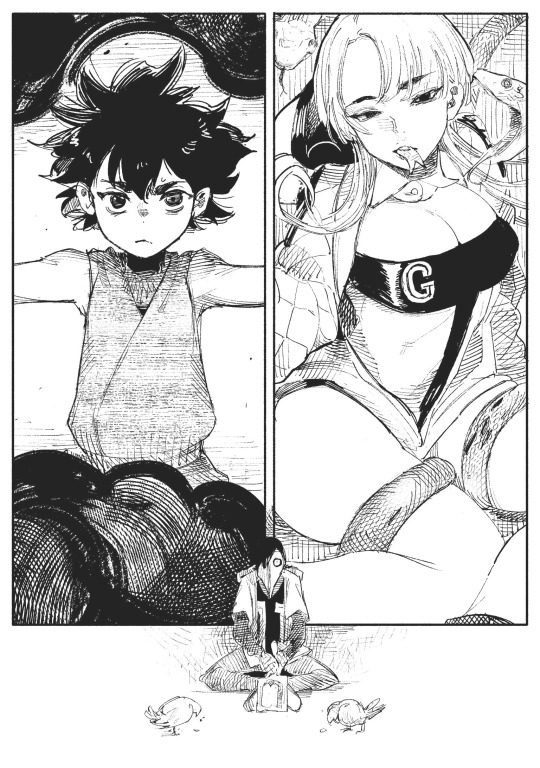
21 notes
·
View notes
Text
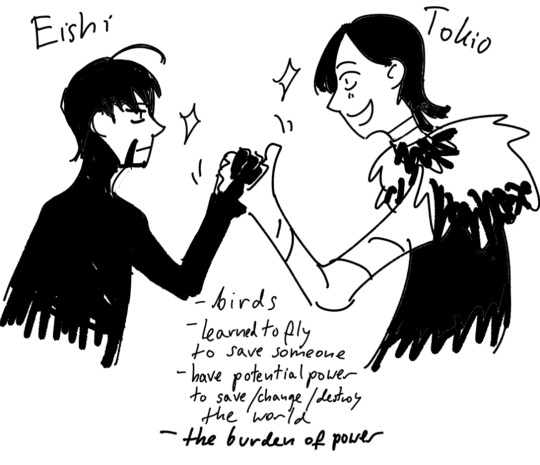
They are besties (in my head)
49 notes
·
View notes
Text
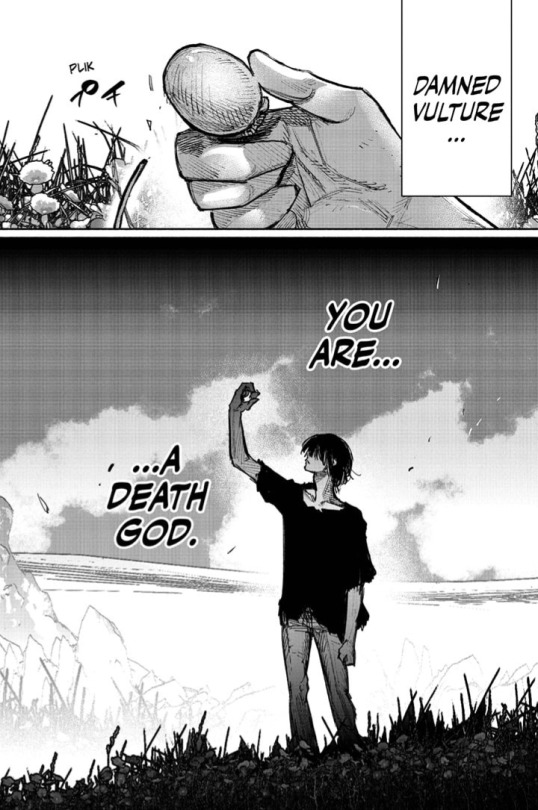
超人X
#超人X#choujin x#kurohara tokio#tokio kurohara#manga#daily manga#dailymanga#manga cap#manga caps#manga edit#manga panel#manga edits#mangacap#monochrome#mangaedit#mangaedits
53 notes
·
View notes
Text

#choujin x#choujinxedit#sui ishida#mangacap#manga screencap#manga aesthetic#manga panel#monochrome#manga#manga cap#mangadaily#tokio kurohara#ely otta
295 notes
·
View notes
Text

Another new year's illustration!
#kaneki ken#tokyo ghoul#kisa tachibana#jack jeanne#tokio kurohara#choujin x#cjx#ishida sui#sui ishida#manga#seinen
80 notes
·
View notes
Note
What do you think of Sora Siruha character?
Before this chapter, i thought Ishida seems wants us to think of her character as a tragic hero and a character that is fallen after leaving yamato mori, but then he drop a chapter where she committed genocide when she was still in yamato mori, so i wonder what do you think of her character?
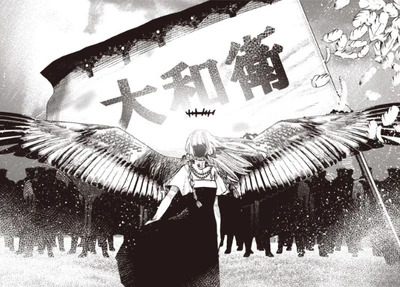
Sora Siruha is an interesting character because Nietzsche would have hated her. Yet she's still seen as morally ambiguous by both characters in her own story and members of the audience. Not that you're wrong to see her that way but Nietzsche sure did hate it was religion. So, perhaps the literal nun, with angel wings, with cross tattoos, and a black halo that doubles as a crown or thorns might be a bad guy in the Nietzsche manga.
That's not to say that she's irredeemably evil, it's just ironic the Choujin X of her generation named after the "ubermensch" represents the antithesis of a lot of Nietzsche's ideas.
Nietzsche famously called Religion the opium of the masses. in Nietzsche's view suffering was not only good but necessary to life, because it aspired people to grow and anything that promised avoidance of suffering alcohol and religion for instance stagnated growth instead of promoting it.
Religious suffering is at the same time an expression of real suffering and a protest against real suffering. Religion is the sigh of the oppressed creature, the sentiment of a heartless world, and the soul of soulless conditions. It is the opium of the people.
So, it's not coincidence in the Nietzsche manga that Sora who has so many religious associations tied to her is also, an opium addict who cannot survive without it's pain numbing effects.


If by Nietzschian philosophy pain is a part of the human experience, then by losing her pain, Sora Siruha also lost her humanity which is heavily implied to be part of the cause of her mental spiral.
One other thing associated with Sora is that she uses what are primarily utilitarian views to justify her atrocities - something else that Nietzsche hated as a philosophy.
So Sora believing that her future visions will come to pass goes on to committ atrocities in order to avoid even greater atrocities. Let's say that her visions are in fact one hundred percent correct. That Sora killing 200,000 people would avert the deaths of 2,000,000 or more.
Sora's reasoning in this case is purely utilitarian.
Utilitarianism actions are morally permissible if: They produce at least as much or more net happiness as any other available action. Everything should strive for a balance of happiness over suffering.
By Utilitarian reasoning her actions are morally permissible. Sora herself does not want to kill Anitise, she takes no joy in it, but she believes like any utilitarian she's responsible for bringing the most happiness over suffering to the world.
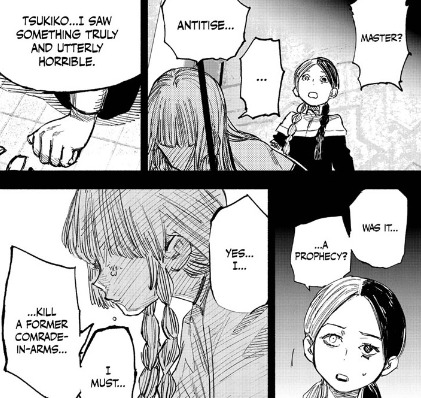
However, even if Sora's vision was 100% correct and by pulling the lever on the trolley problem and killing 200,000 she saved 2,000,000 Nietzsche would still have a bone to pick with her moral reasoning.
Nietzsche famously hated Utilitarianism. because it ignore the value of suffering, which strengthens the man. He saw that doing every and all actions for the sake of the "greater good" was something that denied the individual and discouraged individual development.
Nietzsche's criticism is that value is not something that can be quantified or proven. You can't mathematically measure in an objective sense, the suffering caused by your actions, the benefits caused by your actions. There's no universally agreed upon value for human life.
What is the "unit" of one human life?
Why are the 2,000,000 people that Sora saved more worthy of life than the 200,000 that she killed. What justification can Sora have other than "that's a smaller number." A person among the 200,000 killed could have grown up to cure cancer. Of course, even if the 200,000 weren't especially talented people, even if they were all going to grow up to work at mcdonalds why are there lives inherently worth less than the 2,000,000 that sora decided to save?
Sora is not a nihilist, she is a pure-hearted utilitarian who's actions are taken to give pleasure to as many people as possible but one more obvious criticism of her moral reasoning in choosing to sacrifice the few to save the many is that she is not an unbiased judge of values.
For example, if Anitise really did become a mad king then who would his victims have been? If he invaded Yamato Mori and killed 2,000,000 then why are the 2,000,000 lives of the Yamato Mori citizens he killed worth more than the 200,000 people that Sora killed preventing his invasion? It would be because being a citizen of and responsible for Yamato Mori Sora is unconsciously biased to put her own nation above Anitise's kingdom. In that sense, she's not really acting for the greater good, but rather the national interests of her country but she's still posing herself as a savior figure.
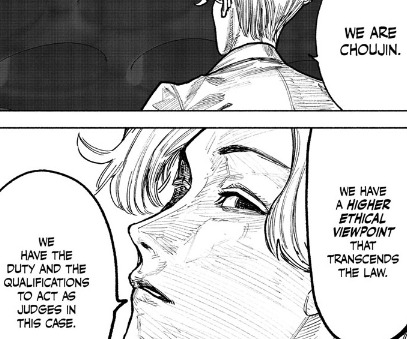
Sora goes on to commit these atrocities, while also continuing to see herself as a savior and believing she's operating from a higher moral viewpoint than everyone else. Yet, you can easily point out where her biases are as I just did.
In addition to the fact that we have no way of knowing if Sora's visions of the future actually are true. The fact that there are two people with future seeing powers (three if you count Tokio's dreams) who can see different things then points to the fact that Sora's visions aren't 100% true. However, even if you give her the benefit of the doubt that her prophecies were going to come true if she didn't do something, you can still make moral arguments against her actions as I just did above this section.
Sora is also extremely biased in other ways. In her origin story, she saw a vision of Queem coming to burn her convent, and was unable to stop it from happening. This clearly has affected her for all of her life, as even when presented with direct evidence that her prophetic dreams might not be true (such as another seer who disagrees with her) Sora doesn't even consider that possibility or hesitate to commit atrocities, because she's still guided by her guilt over being unable to stop her convent from being burnt.
In Tokyo Ghoul, Yoshimura once theorizes that Ghouls and Humans are psychologically the same, but because Ghouls live violent lives they eventually lose their empathy and stop seeing any value in human life as a coping mechanism.
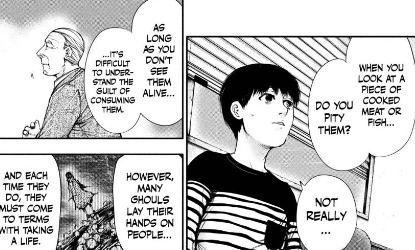
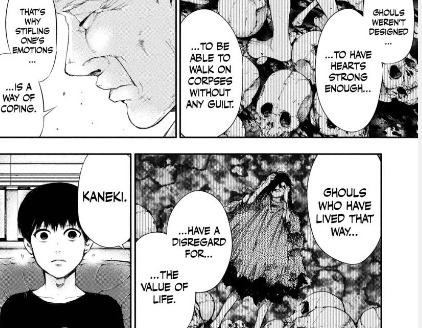
I think Sora's slow corruption makes sense through this lens, not because of her future visions but rather because of the amount of power she had.
Choujin e aren't any different from human psychologically, they experience human emotions, but convince themselves they are different because one they're prone to get in more violent situations, and two the power they wield leads to them developing superiority complexes.
Sora plunged herself into war and had to walk on too many corpses in order to get stronger and gain the strength to fight Queem, but it's clear she didn't stop there after Queem was defeated. After Queem died Sora became the war-monger, and why? Her visions provide us one reason, but like, Sora didn't consider alternative means like diplomacy or warning anitise of what she saw? She just jumped straight to launching a modern day crusade against a foreign country, why?
Was it just easier for her to consider a military invasion because after having been through the hell of war, 200,000 became just another statistic to her?
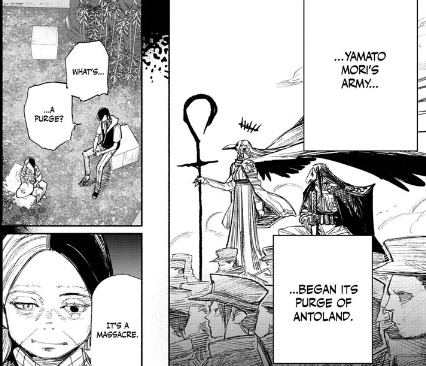
What other reason than she had the power to do so, and Sora's superiority complex told her she had the right to wield that power however she chose to do so.
Sora and her savior complex, provides an uncanny mirror to Queem and his choujin and his choujin supremacy doctrine. Sora may have believed herself invading Antoland in order to prevent a future disaster, but when has a foreign country invading a soveriegn territory "for their own good' ever historically been a good thing. Sora may not have preached choujin supremacy but her actions don't make her too much different from Queem in the end.
Then, there's the possibility that Sora's prophecies might not even be nearly as true or certain to happen as they think they are. One of the birds basically spells it out to Tokio, that humans wanting to know the future is just wishful thinking.
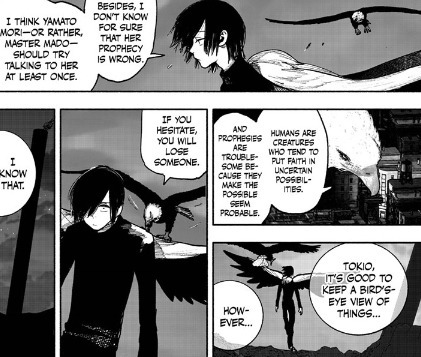
Which puts Sora's absolute certainty in a new light. Is Sora's beliefs in her prophecies just a longing for control, the kind of absolute control over the future that nobody in the world but god is supposed to possess. Sora wanting to take God's place in knowing the future and being able to control her destiny goes all kinds of wrong.
I'm reminded of Attack on Titan where Eren coming into contact with the paths and being able to see the past, present and future at the same time doesn't give him godlike power, but reduces him to a helpless child. Eren's ability to see the future ends up bringing into existence similiarly to Sora, a future where he's the one comitting the atrocities.
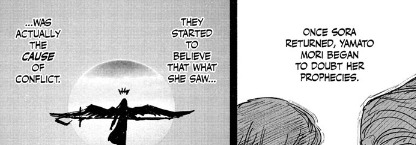
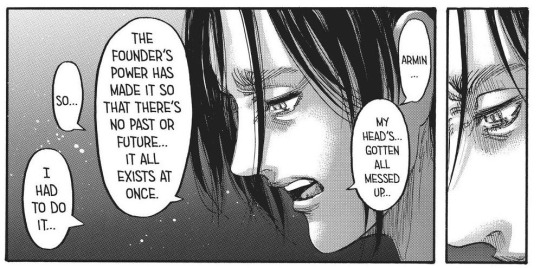
There's also Paul Atreides from Dune who is given the power to see the future, and despite knowing and feeling guilt for a long time that some of his actions might lead to him releasing a holy war against the galaxy and killing billion, goes on to follow the future timeline he saw where he caused those atrocities anyway.
The absolute godlike power to know the future for all three of these characters Sora, Eren and Paul actually leads to them committing atrocities, not averting them as they'd hoped.
Yet, there's the tragic element of the fact she was just sixteen when this destiny was thrust upon her.
In Tokyo Ghoul Eto once referred togod as a child with extraordinary power to justify the world being as messed up as it is. Doesn't this fit Sora Shihouin as well? A child given way too much power and suddenly thrust into a leadership position?
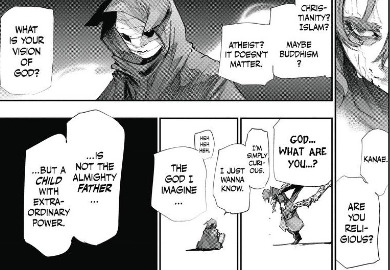

In that way Sora reminds me tragically of X-Men characters like Jean Grey, if someone is given the power to see the future, or the insane powers of the phoenix that Jean Grey was given would they really have the moral fiber not to abuse that power? Can anyone wield that much power and not be corrupted by it?
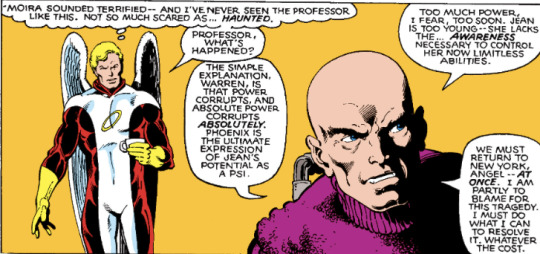
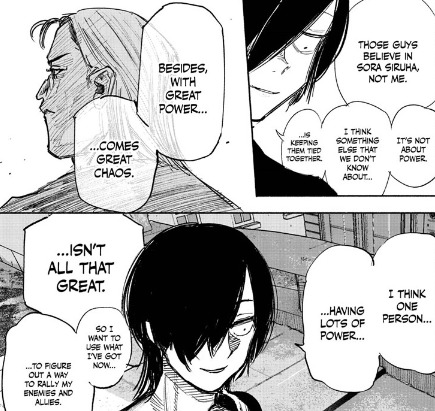
24 notes
·
View notes
